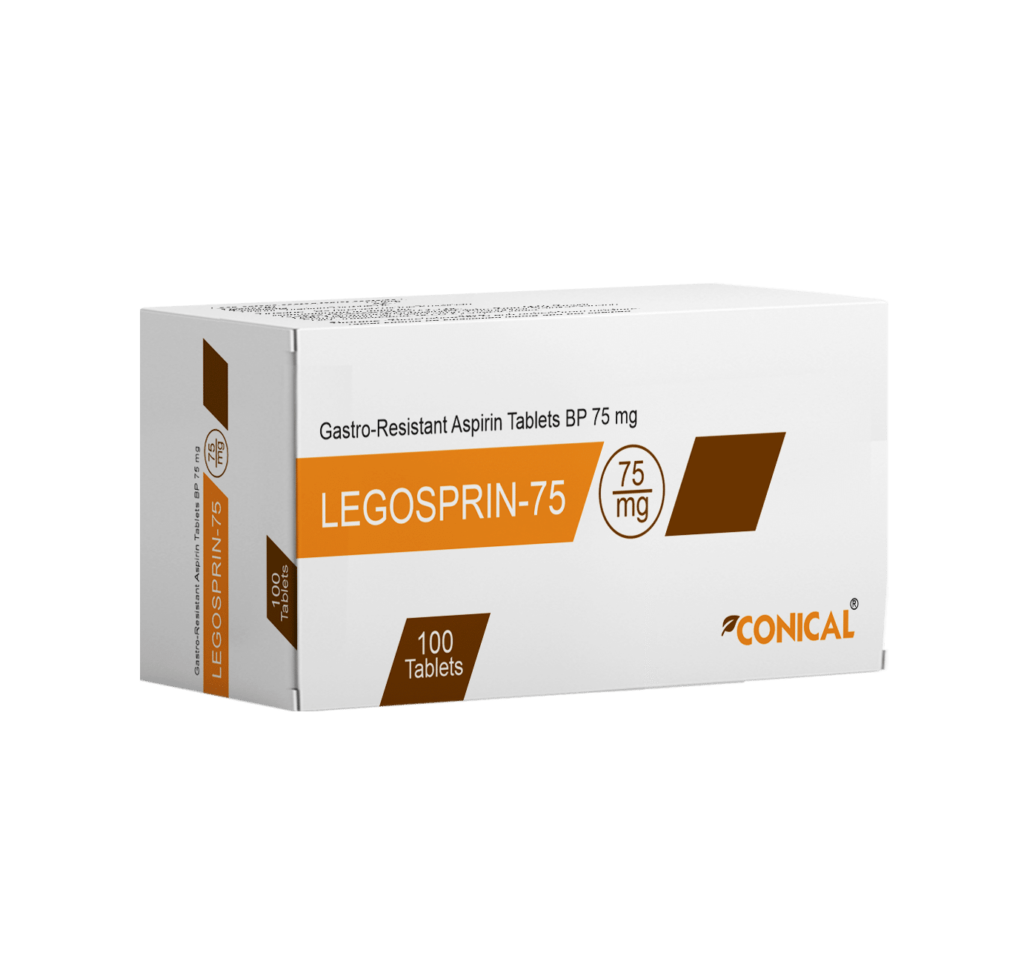
Gastro-Resistant Aspirin Tablets BP 75 mg are used for secondary prevention of thrombotic cerebrovascular or cardiovascular disease following bypass surgery.
gastro-resistant aspirin tablets (75 mg) are an important part of secondary prevention therapy for patients with a history of cardiovascular or cerebrovascular disease, particularly following surgical interventions.
For the management of cardiovascular or cerebrovascular disease:
Patients should seek the advice of a doctor before commencing therapy for the first time.
The usual dosage, for long-term use, is 75-150mg once daily. In some circumstances, a doctor may recommend a higher dose, especially in the short term, allowing up to 300 mg a day. Use acetylsalicylic acids with caution in elderly patients, who are more prone to adverse events. The usual adult dose is appropriate unless severe renal or hepatic insufficiency is present. Review treatment at regular intervals.
Antithrombotic action:
150 mg at diagnosis and 75mg daily thereafter. Chew tablets taken at diagnosis to ensure rapid absorption.
Children:
Do not give to children aged under 16 years, unless specifically indicated (e.g. for Kawasaki’s disease).
Directions for Use
For oral administration to adults only. Swallow the tablet whole; do not chew it.
Side effects are grouped on the basis of System Organ Class. Within each system organ class the frequencies are defined as: very common (≥1/10), common (≥1/100 to <1/10), uncommon (≥1/1,000 to <1/100), rare (≥1/10,000 to <1/1,000), very rare (<1/10,000) and not known (cannot be estimated from the available data).
Blood and lymphatic system disorders
Common: Increased bleeding tendencies, Rare: Thrombocytopenia, granulocytosis, aplastic anaemia
Not Known: Cases of bleeding with prolonged bleeding time such as epistaxis, haematuria, purpura, ecchymoses, haemoptysis, haematoma, cerebral haemorrhage and gingival bleeding,
Existing (haematemesis, melaena) or occult gastrointestinal bleeding, which may lead to iron deficiency anaemia (more common at higher doses). Haemolytic anaemia can occur in patients with glucose-6-phosphate dehydrogenase (G6PD) deficiency.
Immune system disorders:
Rare: Hypersensitivity reactions, skin rashes, urticarial, asthma, bronchospasm, angiooedema,
allergic oedema, anaphylactic reactions including shock
Metabolism and digestive system disorders:
Not known: Hyperuricemia
Nervous system disorders
Rare: Intracranial haemorrhage, Not known: Headache, vertigo
Ear and labyrinth disorders
Not known: Reduced hearing ability; tinnitus
Vascular disorders
Rare: Hemorrhagic vasculitis
Respiratory, thoracic and mediastinal disorders
Uncommon: Rhinitis, dyspnoea, Rare: Bronchospasm, asthma attacks
Reproductive System and mammary disorders
Rare: Menorrhagia
Gastrointestinal disorders
Common: Dyspepsia, Rare: Severe gastrointestinal haemorrhage, nausea, vomiting, gastritis
Not known: Gastric or duodenal ulcers and perforation, diarrhoea.
Hepatobiliary disorders
Not known: Hepatic insufficiency
Skin and subcutaneous tissue disorders
Uncommon: Urticaria, Rare: Steven-Johnsons syndrome, Lyells syndrome, purpura, erythema nodosum, erythema multiforme.
Renal and urinary tract disorders
Not known: Impaired renal function, salt and water retention, urate kidney stones.
Aspirin 75 mg tablets is not suitable for use as an anti-inflammatory/ analgesic/ antipyretic.
-Exercise caution in patients with allergic disease, impaired hepatic or renal function (avoid if severe), and dehydration, as the use of NSAIDs may worsen renal function. Perform liver function tests regularly in patients with slight or moderate hepatic insufficiency.
Aspirin may also precipitate bronchospasm or induce attacks of asthma in susceptible subjects or promote other hypersensitivity reactions.
Serious skin reactions, including Stevens-Johnson syndrome, rarely occur with the use of acetylsalicylic acid. Discontinue aspirin tablets at the first sign of a skin rash, mucosal lesions, or any other indication of hypersensitivity.
The elderly may be more susceptible to the toxic effects of salicylates. Avoid continuous prolonged use of aspirin in the elderly due to the risk of gastrointestinal bleeding and perforation, which can be fatal. When prolonged therapy is necessary, review patients regularly.
Take caution with patients who have glucose-6-phosphate dehydrogenase deficiency, as hemolytic anemia may occur.
Do not recommend aspirin 75 mg tablets during menorrhagia, as they may increase menstrual bleeding.
Aspirin prolongs bleeding time mainly by inhibiting platelet aggregation, so discontinue it several days before scheduled surgical procedures.
Exercise care when stopping antiplatelet therapy after stent insertion, whether after a fixed period or in preparation for a planned surgical procedure, as you must carefully assess the balance between stent thrombosis and excessive bleeding.
There is a possible association between aspirin and Reye’s Syndrome when given to children. Reye’s syndrome is a very rare disease, which affects the brain and liver, and can be fatal. For this reason, do not give aspirin to children under 16 years unless specifically indicated (e.g., for Kawasaki’s disease). Avoid aspirin in late pregnancy and generally during breastfeeding.
Avoid aspirin in late pregnancy and during breastfeeding.
Store below 30°C and protect from moisture.
Keep the medicine out of reach of children.
10 x 10 Alu/Alu blister pack
Legosprin-75 is available in an Alu/Alu blister of 10 tablets. Such 10 blisters in a unit carton with package insert.
Contact us directly to receive full information on the product, the formulation, the science behind it, stability data, and more. Our Business Development Manager is a click away.
Conical Pharmaceuticals is a professionally managed and dynamic organization with decades of experience in the pharmaceutical field. With a desire of providing opportunities for a better life, we work very hard to bring quality drugs to our customers. We have instilled a level of trust and confidence amongst our clients by supplying the best quality products.